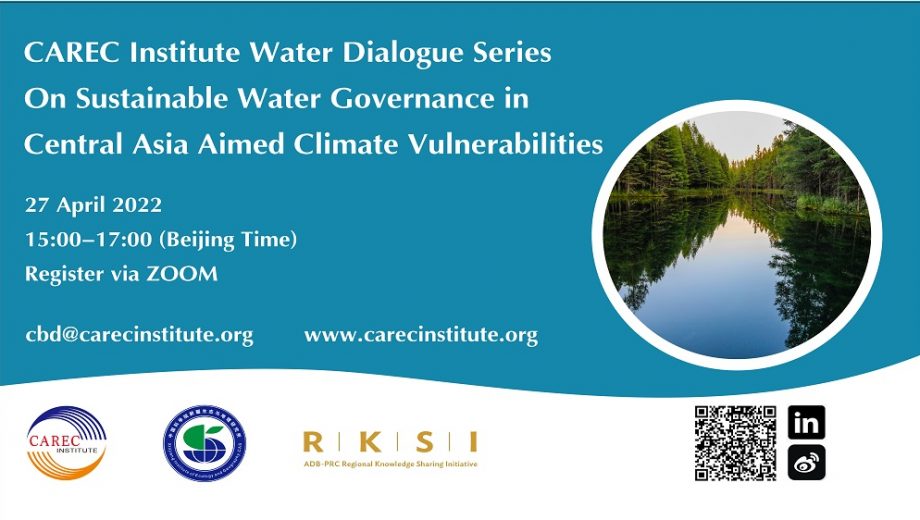Seminar & Lecture Series
CAREC Institute Water Dialogue Series on Sustainable Water Governance in Central Asia
27 Apr 2022 Online
In April 2022, the CAREC Institute, in partnership with the ADB, RKSI and Xinjiang Institute of Ecology & Geography, CAS (XIEG), will deliver a regional water dialogue based on “Water Footprint Analysis of Central Asia”, an analytical study conducted by Water Footprint Implementation (WFI) and supported by Swiss Agency for Development and Cooperation (SDC) within scope of Blue Peace Initiative. This is the second dialogue on sustainable water management in Central Asia.
The overall aim of this dialogue is to facilitate open discussions among leading water management experts on pathways to sustainable, climate adaptive water management systems in Central Asian countries. Also, to discuss, analyze and select practical implications of Water Footprint report for Central Asia and to further explore potential coordination mechanisms among ADB/CAREC Water Pillar, regional projects, initiatives, and activities of all stakeholders in Central Asia.
In addition to organizing bodies and development partner experts, relevant experts and interested wider audience from across the CAREC region and beyond are expected to participate in the dialogue.
CAREC Institute has started series of water dialogues with development partners and stakeholders in the CAREC region. The main aim of the CAREC Institute water dialogue series is to analyze the crucial role of water in ongoing and post-COVID developments as well as longer term sustainable growth of the CAREC region. The first dialogue was conducted on 10 February 2022.
Register here to participate.
Agenda:
| Time | Program |
|---|---|
| 10:00 – 10:20 | Opening Ceremony Moderator: Ms. Li Linyi, Deputy Director of International Exchange Division, International Poverty Reduction Center in China (IPRCC). Welcome Remarks: Ms. Li Xin, Deputy Director-General of IPRCC. |
| 10:20 – 12:00 | Country Presentation I Moderator: Ms. Li Linyi, Deputy Director of International Exchange Division of IPRCC. Commentator: Dr. Zhang Chuanhong, Associate Professor of China Agricultural University. Speakers (20 minutes each): 1. Diversification of Income for Poor Farmers. Mr. Horn Kimhong, Program Coordinator, Dan Church Aid, Cambodia. 2. PRC Aided Pilot Project of Poverty Reduction Cooperation in Myanmar. Mr. Win Kyaw Myo, Director, Department of Rural Development, Ministry of Cooperatives and Rural Development, Myanmar. 3. Mr. Htun Htun Oo, Second Secretary, Embassy of Myanmar. 4. Exploration and Experience: Rural Revitalization in the PRC. Dr. Xu Jin, Associate Professor, China Agricultural University. |
| 12:00 – 14:30 | Break |
| 14:30 – 16:00 | Country Presentation II Moderator: Ms. Maha Ahmed, Deputy Country Director, World Food Programme. Speakers (20 minutes each): 1. Singapore’s Approach to Social Assistance and Community Development. Ms. Lau Amanda, Manager, Ministry of Social and Family Development, Singapore. 2. Tourist Attraction/Learning Community, Baan Nam Sap Learning Center. Mrs. Suttapak Panpapai, Foreign Relations Officer, Professional Level, ASEAN Unit, Office of Permanent Secretariat, Ministry of Interior, Thailand. 3. D-Hope Project Thailand. Mrs. Nicha Premchan, Foreign Relation Officer, Professional Level, Department of Community Development, Thailand. 4. Case Introduction and Video Presentation of Hesilu Village in Zhejiang Province. Mr. He Yunhui, Party Secretary of Hesilu Village, Zhejiang Province, the PRC. |
| 16:00 – 16:20 | Closing Ceremony Closing Remarks: Mr. Miguel Musngi, Senior Officer, Poverty Eradication and Gender Division of the ASEAN Secretariat. |


